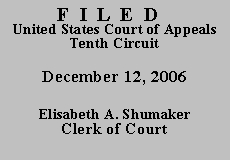

| UNITED STATES OF AMERICA, |
|
| v. | |
| KEVIN J. CROCKETT, |
|
A district court's denial of a motion for relief under 28 U.S.C. § 2255 may be appealed only if the district court or this Court first issues a COA. 28 U.S.C. § 2253(c)(1)(B). Congress has determined that a COA will issue "only if the applicant has made a substantial showing of the denial of a constitutional right." 28 U.S.C. § 2253(c)(2). The applicant may satisfy this standard "by demonstrating that jurists of reason could disagree with the district court's resolution of his constitutional claims," or alternatively, "that jurists could conclude the issues presented are adequate to deserve encouragement to proceed further." Miller-El v. Cockrell, 537 U.S. 322, 327 (2003).
Mr. Crockett argues that the federal district court lacked subject matter jurisdiction over his criminal case. He also contends the government failed to state the amount of tax due in its prosecution of the two tax counts.
As to the first claim, Mr. Crockett was charged with federal crimes, and federal district courts have exclusive jurisdiction over all offenses against the United States, including tax crimes as defined in Title 26 of the United States Code. 18 U.S.C. 3231; United States v. Collins, 920 F.2d 619, 629-30 (10th Cir. 1990). Mr. Crockett argues against district court jurisdiction on the ostensible ground that "[t]he government failed to prove that it had a bona fide property interest of the United States. Prospective tax collection are not a bona fide property interest of the United States. (See Baral v. U.S., 528 U.S. 431 (2000)." Appellant's Br. 1. We are not sure what this has to do with jurisdiction. The Baral decision was not a criminal tax prosecution, had nothing to do with jurisdiction, and did not mention anything about bona fide property interests of the United States. Mr. Crockett was indicted and charged for a violation of the criminal laws of the United States, and whether or not the government proved it had a bona fide property interest in prospective tax collection--whatever that means--the federal district court had jurisdiction over the case.
Contrary to Mr. Crockett's second claim, the government was not required to specify an amount of tax due in its prosecution of 26 U.S.C. 7206(2). The statute enunciates three elements the government must prove: (1) that the defendant aided, assisted, procured, counseled, or advised the preparation of a tax return; (2) that the return was fraudulent or false as to a material matter; and (3) that the defendant acted willfully. See United States v. Cutler, 948 F.2d 691, 694 (10th Cir. 1991). Mr. Crockett does not deny that the government successfully proved each of these elements.
In his COA application, Mr. Crockett raises two arguments not made to the court below. He argues that the interval between his indictment and trial exceeded the seventy-day period mandated by the Speedy Trial Act, 18 U.S.C. 3161(c)(1); he also raises an ineffective assistance of counsel claim. Because Mr. Crockett failed to argue these points before the district court, we decline to address them now. Apodaca v. City of Albuquerque, 443 F.3d 1286, 1289 (10th Cir. 2006).
We therefore DENY Mr. Crockett's request for a COA and DISMISS this appeal. Petitioner's motion to proceed in forma pauperis is also DENIED.
Entered for the Court,
Michael W. McConnell
Circuit Judge
*.After examining the briefs and appellate record, this panel has determined unanimously that oral argument would not materially assist in the determination of this appeal. See Fed. R. App. P. 34(a)(2); 10th Cir. R. 34.1(G). This case is therefore submitted without oral argument. This order and judgment is not binding precedent except under the doctrines of law of the case, res judicata and collateral estoppel. It may be cited, however, for its persuasive value consistent with Fed. R. App. P. 32.1 (eff. Dec. 1, 2006) and 10th Cir. R. 32.1 (eff. Jan. 1, 2007).